Weston Ochse's Blog, page 8
May 30, 2017
I Blame It On The Green Power Ranger
By now everyone knows that a crazy man from Mesa, Arizona came to Phoenix Comiccon thinking that he was the Punisher and that he needed to kill bad cops AND the Green Power Ranger. Not sure where the Green Power Ranger fit into it, but you can't explain crazy. Seems the 'Punisher' had three loaded pistols, a shotgun, a knife and ninja stars. Yes. Now pause a moment to imagine when and where he thought he was going to use throwing stars.
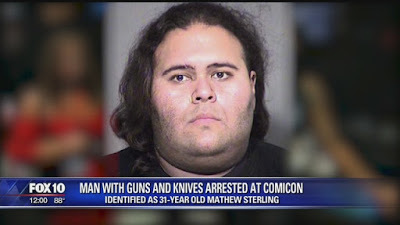 Because of this, numbers were down. That still didn't keep the wait on Friday from being 1.5 to 2 hours to get into the hall. Chewbaccas were passing out left and right in the desert heat. I didn't anticipate the heightened security and I sauntered over from my hotel at 1030 thinking I was going to make my 11:00 panel. The line had at least 4,000 people in it. I walked up to who I discerned (correctly) as the head of security, showed him my guest badge, then was told to get to the back of the line. I pressed, pointing out politely that I was a guest of the con and had con business I had to get to and he let me in a side door where Don the Maintenance Man patted me down and escorted me into the convention center. I doubt Don the Maintenance Man was part of the backup security plan... or was he.
Because of this, numbers were down. That still didn't keep the wait on Friday from being 1.5 to 2 hours to get into the hall. Chewbaccas were passing out left and right in the desert heat. I didn't anticipate the heightened security and I sauntered over from my hotel at 1030 thinking I was going to make my 11:00 panel. The line had at least 4,000 people in it. I walked up to who I discerned (correctly) as the head of security, showed him my guest badge, then was told to get to the back of the line. I pressed, pointing out politely that I was a guest of the con and had con business I had to get to and he let me in a side door where Don the Maintenance Man patted me down and escorted me into the convention center. I doubt Don the Maintenance Man was part of the backup security plan... or was he.
Still, the con handled the situation and by Saturday, the lines weren't as long.
Great convention this year. I'll give a full report later in the week.
 Because of this, numbers were down. That still didn't keep the wait on Friday from being 1.5 to 2 hours to get into the hall. Chewbaccas were passing out left and right in the desert heat. I didn't anticipate the heightened security and I sauntered over from my hotel at 1030 thinking I was going to make my 11:00 panel. The line had at least 4,000 people in it. I walked up to who I discerned (correctly) as the head of security, showed him my guest badge, then was told to get to the back of the line. I pressed, pointing out politely that I was a guest of the con and had con business I had to get to and he let me in a side door where Don the Maintenance Man patted me down and escorted me into the convention center. I doubt Don the Maintenance Man was part of the backup security plan... or was he.
Because of this, numbers were down. That still didn't keep the wait on Friday from being 1.5 to 2 hours to get into the hall. Chewbaccas were passing out left and right in the desert heat. I didn't anticipate the heightened security and I sauntered over from my hotel at 1030 thinking I was going to make my 11:00 panel. The line had at least 4,000 people in it. I walked up to who I discerned (correctly) as the head of security, showed him my guest badge, then was told to get to the back of the line. I pressed, pointing out politely that I was a guest of the con and had con business I had to get to and he let me in a side door where Don the Maintenance Man patted me down and escorted me into the convention center. I doubt Don the Maintenance Man was part of the backup security plan... or was he.Still, the con handled the situation and by Saturday, the lines weren't as long.
Great convention this year. I'll give a full report later in the week.
Published on May 30, 2017 09:54
December 5, 2016
Bring Back the McRib You Franchizing Scoundrels!!
I stand with Young Xanthe Pajarillo. Watch her video and stand strong with us!
What I learned from this video:
-McDonalds franchise owners have been given the option of selling the McRib or not and only 55% have decided to sell it, thus disenfranchising 45% of the American and Tourist McRib-eating public.-Thanksgiving without a McRib is like a Christmas without snow.
-Consumers have had to resort to McRibLocator.com, which gives disappointing results because it shows how far your wondermeat is away from you.
-The McDonalds on Shakala Lane next to the In and Out Burger is definitely NOT selling the McRib.
-The All Day Breakfast is like a really poor substitute for the McRib.
-The removal of the McRib from the menu has adversely effected families during the holidays.
-Especially those who would order a 50 piece chicken McNugget and 10 McRibs as their 21st Century version of poultry and ham, which results in messed up and broken holiday spirits.
-If you call the hotline they won’t take you seriously.
-I'm disturbed to inform you that the nearest McRrib to my house is at 551 Telegraph Canyon Road, Chula Vista, CA, about 410 miles away.
BUT WAIT THERE'S MORE!!
THE MCRIB SAGAS CONTINUE!!
I DON'T STAND WITH CARLA THE THROAT PUNCHER!
-What I learned from this Video:
-The drive thru was filled all the way up so she had to go inside. Thank god, because she was clearly drinking.
-You supposed to offer an Extra McRib for a dollar when you ask for the McRib Meal.
-Never tell a drunk woman that she doesn't really need an extra McRib.
-McScuse me bitch is a new term.
-Charlene was just throat punched.
-You are invited by Carla to also punch Charlene in the cooter.
I DO STAND WITH THIS GIRL DOING HER OWN RENDITION OF CARLA!
I DON'T STAND WITH CARLA THE VOODOO COOTER PUNCHER!
What I learned from this video:
-Never give Carla a voodoo doll of Charlene.
-You can buy voodoo dolls on ebay.
-If you repeatedly punch the voodoo doll in the cooter an ambulance will come.
-Voodoo works.
I DO STILL STAND WITH XANTHE, THOUGH!
What I learned from this video:
-America fell hard for the sauce we all adore.
-Germany serves the McRib all year around.
-McDonalds chose to rob her family of tradition.
-They'll do what it takes to bring it back on the menu.
NOW WHO DO YOU STAND WITH?
CARLA OR XANTHE OR BOTH?
TAKE A SIDE!
MAKE A STAND!
EAT A MCRIB!
What I learned from this video:
-McDonalds franchise owners have been given the option of selling the McRib or not and only 55% have decided to sell it, thus disenfranchising 45% of the American and Tourist McRib-eating public.-Thanksgiving without a McRib is like a Christmas without snow.
-Consumers have had to resort to McRibLocator.com, which gives disappointing results because it shows how far your wondermeat is away from you.
-The McDonalds on Shakala Lane next to the In and Out Burger is definitely NOT selling the McRib.
-The All Day Breakfast is like a really poor substitute for the McRib.
-The removal of the McRib from the menu has adversely effected families during the holidays.
-Especially those who would order a 50 piece chicken McNugget and 10 McRibs as their 21st Century version of poultry and ham, which results in messed up and broken holiday spirits.
-If you call the hotline they won’t take you seriously.
-I'm disturbed to inform you that the nearest McRrib to my house is at 551 Telegraph Canyon Road, Chula Vista, CA, about 410 miles away.
BUT WAIT THERE'S MORE!!
THE MCRIB SAGAS CONTINUE!!
I DON'T STAND WITH CARLA THE THROAT PUNCHER!
-What I learned from this Video:
-The drive thru was filled all the way up so she had to go inside. Thank god, because she was clearly drinking.
-You supposed to offer an Extra McRib for a dollar when you ask for the McRib Meal.
-Never tell a drunk woman that she doesn't really need an extra McRib.
-McScuse me bitch is a new term.
-Charlene was just throat punched.
-You are invited by Carla to also punch Charlene in the cooter.
I DO STAND WITH THIS GIRL DOING HER OWN RENDITION OF CARLA!
I DON'T STAND WITH CARLA THE VOODOO COOTER PUNCHER!
What I learned from this video:
-Never give Carla a voodoo doll of Charlene.
-You can buy voodoo dolls on ebay.
-If you repeatedly punch the voodoo doll in the cooter an ambulance will come.
-Voodoo works.
I DO STILL STAND WITH XANTHE, THOUGH!
What I learned from this video:
-America fell hard for the sauce we all adore.
-Germany serves the McRib all year around.
-McDonalds chose to rob her family of tradition.
-They'll do what it takes to bring it back on the menu.
NOW WHO DO YOU STAND WITH?
CARLA OR XANTHE OR BOTH?
TAKE A SIDE!
MAKE A STAND!
EAT A MCRIB!
Published on December 05, 2016 14:22
October 22, 2016
Welcome to LaGrange House
We've been teasing this enough that even some of my oldest friends are saying, 'alright already!' (Barbara Foster) So I won't belabor this or tease anyone any longer. Yvonne and I were recently able to realize a dream. We bought a vacation/retirement home in Astoria, Oregon. Why Astoria? Besides the fishing and the culture and the small town environment and the Columbia River and the Pacific Ocean and a butcher shop and a couple of cool coffee shops and the seafood and the relation to all the beaches on the ocean and the razor clams and the salmon... I can't think of any reason.
 A sunset view of the Columbia River and bridge to Washington State
A sunset view of the Columbia River and bridge to Washington State
We've been looking for a home near and around there for over three years. Yvonne and I both have saved searched in Trulia and Zillow. A new home will occasionally pop and we'd look at it but it wouldn't have those things we were looking for.
What is this criteria?
A view of the water-CHECK
A home with interesting characteristics-CHECK
A home situated so one could walk downtown-CHECK
A home we could afford a down payment on and a second mortgage-IMPORTANT CHECK
 This is the view from our house of the river and bridge. Notice the ocean going vessel beneath the bridge.
This is the view from our house of the river and bridge. Notice the ocean going vessel beneath the bridge.
At this point the Columbia River is 4.5 miles across.
So about the second week in August this happened.
The home was listed on a Monday.
Yvonne saw it on a Tuesday.
We got serious about it on Wednesday.
We hired an agent on Thursday.
We flew out on Friday.
We saw the home in person on Saturday and made an offer (along with eleven others).
We were nervous as hell all day Sunday.
They accepted our offer on Monday.
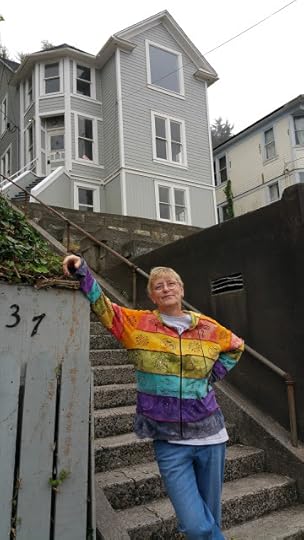 The day we put an offer in on the house. Not for the faint of heart. 32 steps from the street to the landing,
The day we put an offer in on the house. Not for the faint of heart. 32 steps from the street to the landing,
then another 13 steps to the front door.
Yep. It happened that fast.
The home is a 1900 Victorian and retains some of its charm.
Yvonne is up in Astoria this week taking bids for some extra work that still needs to be done on it: e.g. French Drain, gutters, chimney sleeve, etc. The home was flipped and the flipper was lazy. You should have seen the names the flipper was called by the inspector. He sure didn't like some of the shabby work. Before closing, the flipper fixed and repaired a bunch of stuff, but there's still stuff to be done.
The idea is for us to be able to go there on vacations, as well as our friends and family. I'd rather have the place used, than empty.
Why call it LaGrange house? We have some great friends named Herb and Diane who have a home on the Potomac everyone affectionately calls Cedar Lodge. Far from a lodge, this sprawling manse could house a battalion. Originally built in the 1700s, it's been added on to over the years and is just the most restful spot on the planet. We'd like to create another such spot, only this one one the West Coast.
Why LaGrange? Besides the fact that I like that word, a Lagrange Point in science is a location in space where the combined gravitational forces of two large bodies, such as Earth and the sun or Earth and the moon, equal the centrifugal force felt by a much smaller third body. Lagrange House rests equally between what is and what can be, locked in stasis by the gravitational weight of the past and future. It is a place outside of time. A place outside of enmity. And a place outside of the worries of the world.
LaGrange House.
And it's ours to share with the world.
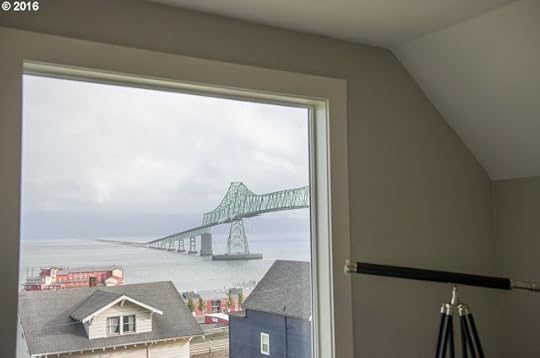 View from the third floor window - THIS SOLD IT FOR ME
View from the third floor window - THIS SOLD IT FOR ME
 Other side of the same window
Other side of the same window
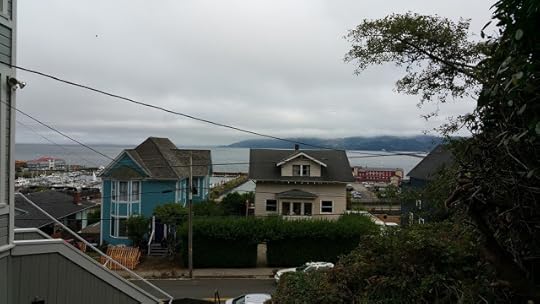 View from a side deck
View from a side deck
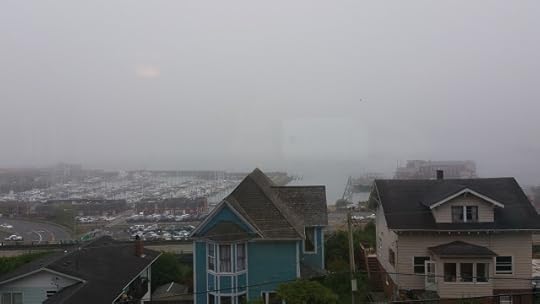 View from the front steps
View from the front steps
 A sunset view of the Columbia River and bridge to Washington State
A sunset view of the Columbia River and bridge to Washington StateWe've been looking for a home near and around there for over three years. Yvonne and I both have saved searched in Trulia and Zillow. A new home will occasionally pop and we'd look at it but it wouldn't have those things we were looking for.
What is this criteria?
A view of the water-CHECK
A home with interesting characteristics-CHECK
A home situated so one could walk downtown-CHECK
A home we could afford a down payment on and a second mortgage-IMPORTANT CHECK
 This is the view from our house of the river and bridge. Notice the ocean going vessel beneath the bridge.
This is the view from our house of the river and bridge. Notice the ocean going vessel beneath the bridge. At this point the Columbia River is 4.5 miles across.
So about the second week in August this happened.
The home was listed on a Monday.
Yvonne saw it on a Tuesday.
We got serious about it on Wednesday.
We hired an agent on Thursday.
We flew out on Friday.
We saw the home in person on Saturday and made an offer (along with eleven others).
We were nervous as hell all day Sunday.
They accepted our offer on Monday.
 The day we put an offer in on the house. Not for the faint of heart. 32 steps from the street to the landing,
The day we put an offer in on the house. Not for the faint of heart. 32 steps from the street to the landing, then another 13 steps to the front door.
Yep. It happened that fast.
The home is a 1900 Victorian and retains some of its charm.
Yvonne is up in Astoria this week taking bids for some extra work that still needs to be done on it: e.g. French Drain, gutters, chimney sleeve, etc. The home was flipped and the flipper was lazy. You should have seen the names the flipper was called by the inspector. He sure didn't like some of the shabby work. Before closing, the flipper fixed and repaired a bunch of stuff, but there's still stuff to be done.
The idea is for us to be able to go there on vacations, as well as our friends and family. I'd rather have the place used, than empty.
Why call it LaGrange house? We have some great friends named Herb and Diane who have a home on the Potomac everyone affectionately calls Cedar Lodge. Far from a lodge, this sprawling manse could house a battalion. Originally built in the 1700s, it's been added on to over the years and is just the most restful spot on the planet. We'd like to create another such spot, only this one one the West Coast.
Why LaGrange? Besides the fact that I like that word, a Lagrange Point in science is a location in space where the combined gravitational forces of two large bodies, such as Earth and the sun or Earth and the moon, equal the centrifugal force felt by a much smaller third body. Lagrange House rests equally between what is and what can be, locked in stasis by the gravitational weight of the past and future. It is a place outside of time. A place outside of enmity. And a place outside of the worries of the world.
LaGrange House.
And it's ours to share with the world.
 View from the third floor window - THIS SOLD IT FOR ME
View from the third floor window - THIS SOLD IT FOR ME Other side of the same window
Other side of the same window View from a side deck
View from a side deck View from the front steps
View from the front steps
Published on October 22, 2016 13:35
October 11, 2016
My Thoughts on PTSD: a #HoldOntoTheLight Post
Author's Note: While I'm talking about one of my books in this essay, I'm merely using it as an example to express certain points. Please don't feel as if you need to go out and buy my book when you read this. If you want to, then thank you, but I wanted readers to understand that the point of this essay wasn't to sell you something. My use of the book as an example was designed to highlight aspects of PTSD.
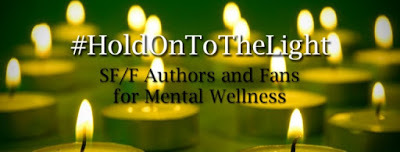
POST-TRAUMATIC STRESS DISORDER is a very real and sensitive subject, but that doesn’t mean we have to tiptoe around it. Nor does it mean we should leave it alone because we’re afraid we’ll trigger something. I’ve spoken with and served with enough vets with PTSD to know that they’d prefer to deal with it head on if they could. Which was a major reason why I made it the central theme of my very first military science-fiction novel – Grunt Life (Solaris Books). The book's characters are steeped in the realities of Post-Traumatic Stress Disorder’s most notable symptoms – suicide, and depression. The publisher was worried when I turned in the manuscript. And I get that. But then again, how many authors out there have my military credentials. As a military man with thirty years of military service and combat deployments, I know about PTSD first hand, and used all of my chops to give it the respect and spotlight it needed.
Still, it is a heavy issue and might turn some off. Despite that, I wanted it to be a central theme to Grunt Life. Not only am I trying to make readers understand what it's like to have PTSD, but I'm also turning PTSD sufferers into heroes. Too often they think themselves the opposite. They feel broken and different. This is where I show them what their true value is, if only as a fictional construct, as active agents who are solely able to save planet Earth.
Grunt Life is a PRO-PTSD novel if nothing else.
But let’s take a look at some facts about PTSD from the U.S. Veteran's Administration:
About 7 or 8 out of every 100 people (or 7-8% of the population) will have PTSD at some point in their lives. About 5.2 million adults have PTSD during a given year. This is only a small portion of those who have gone through a trauma.Women are more likely than men to develop PTSD. About 10% of women develop PTSD sometime in their lives compared with 5% of men. Also:
Experts think PTSD occurs:In about 11-20% of Veterans of the Iraq and Afghanistan wars (Operations Iraqi and Enduring Freedom), or in the range of 11-20 Veterans out of 100 who served in OEF/OIF.In as many as 10% of Gulf War (Desert Storm) Veterans, or in 10 Gulf War Veterans out of 100.In about 30% of Vietnam Veterans, or about 30 out of 100 Vietnam Veterans.My personal belief is that if you've seen something you can't unsee or if you've been in an accident or a combat zone that you have PTSD period. For many of us it doesn't manifest in a major way. But I still flinch when my screen saver comes on and a dozen small other contrivances every day.
Many PTSD sufferers, like the characters in my book Grunt Life, can see no way clear of their disorder and often take their own lives. This excerpt from Forbes Magazine is sobering. "Almost once an hour – every 65 minutes to be precise – a military veteran commits suicide, says a new investigation by the Department of Veterans Affairs. By far the most extensive study of veteran suicides ever conducted, the report, issued Friday, examined suicide data from 1999 to 2010."
The data in the Forbes Magazine article was then compared with a previous investigation – primarily an estimation – that had been conducted over the same time period, and had found a suicide rate of eighteen per day. Many of these suicides involve older veterans; 69 percent of the suicides recorded were by veterans age fifty and older. But another way to look at this is that 31 percent of these suicides were by veterans forty-nine and younger. In other words, by men in the prime of life.
And then there are the shockingly common active duty suicides. Just two weeks ago, the military released data showing that suicides among those on active duty hit a record high in 2012. There were 349 suicides among active duty personnel – almost one a day. That means there are now more suicides among active duty soldiers than there are combat deaths.
I want to make it clear that Grunt Life is a work of fiction. I chose to have PTSD as a central theme because I see so many war-themed books out there who won't touch it. Those that do tend to use a PTSD sufferer as a bad guy, shooting people, out of control, and nothing more than a cardboard character you’re supposed to hate. But there have been other books about PTSD and you probably didn’t even know it. Tolkein’s characters literally ring with the ramifications of their actions and what they have seen and done. The societal breakdown in Lord of the Flies is PTSD manifest, the ultimate desensitization and dehumanization of humans. Heinlein’s Glory Road, for all of its fantastical interstellar swashbuckling, is at heart the story of a PTSD sufferer returning from combat in a Southeast Asian country.
While the messages in these novels were more subtle, I’m using the sledgehammer approach in Grunt Life. There is no doubt that the characters have PTSD, which is why Solaris called the book the darkest science fiction book in the history of their publishing house. If my only success is to bring more attention to it, then good. But I think I’ve achieved more.
The popular website Pop Cults focused heavily into the PTSD aspects with an absolutely glowing review of Grunt Life. They actually got what I was trying to do, which means it worked.
'With Grunt Life, I feel like Ochse was striving to write the kind of military narrative that Heinlein or Haldeman would have written. I am a huge fan of both authors, and Ochse is well on his way to joining their ranks, but I don’t think he is quite there. He is close, and he is on the right track — heck, he even acknowledges Haldeman at the end of the book. Ochse goes beyond the normal chaos of combat and asks the tough questions that we, as a greater society, are just starting to ask. In this novel, he addresses one of the biggest killers of our veterans these days: suicide. While the taking of one’s life has been addressed before, Ochse embraces it and integrates it into his story without making it the focus of the book or glorifying it. The book starts out with a suicide attempt, but it isn’t for the reasons that you would expect. Ochse was willing to get past the Hollywood and mainstream media explanations of military suicide and try to address some of the real reasons why veterans would be willing to end their lives. This is a subject that needs to be addressed openly and honestly, and Ochse was brave enough to risk turning some readers off to do it. I think that many of the readers who do get turned off by his frank observations on this subject might feel that way because it hits way too close to home. I don’t want this to sound like a challenge, but for some folks out there, this might be the book that makes them stop and think.'
My colleague in both writing and the military, the inestimable Myke Cole says that “PTSD is not a disease it’s a world view. War, disaster response, police work, these things force a person to live in the spaces where trauma happens, to spend most of their time there, until that world becomes yours, seeps through your skin and runs in your blood… PTSD is what happens when all that is stripped away. It is the curtain pulled back, the deep and thematic realization that life is fungible, that death is capricious and sudden. That anyone’s life can be snuffed out or worse, ruined, in the space of a few seconds. It is the shaking realization that love cannot protect you, and even worse, that you cannot protect those you love. It is the final surrendering of the myth that, if you are decent enough, ethical enough, skilled enough, you’ll be spared.”
It used to be, for the most part, that you had to be in a particular line of work to earn this world view. For one to get PTSD you had to be at the wrong place at the wrong time. That’s not necessarily the case anymore. The internet has democratized PTSD opportunities, allowing viewers to watch beheadings, terrorists burning victims alive, people being shot, run over, and falling to their deaths. The very act of witnessing these things puts a person in that space that Myke describes when one realizes that life is fungible. Some are able to take it better than others. Because I’ve seen enough death in my own life, I don’t watch these. I’ve never watched a beheading and never will.
But many people do.
Can you imagine what it does to them?
Have you watched these videos?
How did it make you feel?
Hs it changed you?
Would you even know if it did?
It’s also important to understand that the military isn't the only high percentage group with PTSD sufferers. Police and fire fighters, as well as rape victims and victims of sexual abuse have a very high rate of PTSD as well. Nurses, doctors and paramedics have a high incidence of PTSD. You could literally spend your day interacting with PTSD sufferers and not even know it.
So at the very least, treat everyone with respect.
If you write about PTSD, do it in a positive and constructive manner.
And that woman in the middle of road rage or the guy not moving fast enough for you in the line you're queued up in, they might be having a hard time of it, so maybe think about treating them that way.
You don’t know what they’ve seen.
You don’t know what they’ve done.
We all need to learn to live on this planet together.
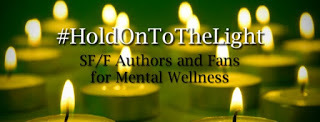
About the campaign:
#HoldOntoTheLight is a blog campaign encompassing blog posts by fantasy and science fiction authors around the world in an effort to raise awareness around treatment for depression, suicide prevention, domestic violence intervention, PTSD initiatives, bullying prevention and other mental health-related issues. We believe fandom should be supportive, welcoming and inclusive, in the long tradition of fandom taking care of its own. We encourage readers and fans to seek the help they or their loved ones need without shame or embarrassment.
Please consider donating to or volunteering for organizations dedicated to treatment and prevention such as: American Foundation for Suicide Prevention, Home for the Warriors (PTSD), National Alliance on Mental Illness (NAMI), Canadian Mental Health Association, MIND (UK), SANE (UK), BeyondBlue (Australia), To Write Love On Her Arms and the National Suicide Prevention Hotline.

POST-TRAUMATIC STRESS DISORDER is a very real and sensitive subject, but that doesn’t mean we have to tiptoe around it. Nor does it mean we should leave it alone because we’re afraid we’ll trigger something. I’ve spoken with and served with enough vets with PTSD to know that they’d prefer to deal with it head on if they could. Which was a major reason why I made it the central theme of my very first military science-fiction novel – Grunt Life (Solaris Books). The book's characters are steeped in the realities of Post-Traumatic Stress Disorder’s most notable symptoms – suicide, and depression. The publisher was worried when I turned in the manuscript. And I get that. But then again, how many authors out there have my military credentials. As a military man with thirty years of military service and combat deployments, I know about PTSD first hand, and used all of my chops to give it the respect and spotlight it needed.
Still, it is a heavy issue and might turn some off. Despite that, I wanted it to be a central theme to Grunt Life. Not only am I trying to make readers understand what it's like to have PTSD, but I'm also turning PTSD sufferers into heroes. Too often they think themselves the opposite. They feel broken and different. This is where I show them what their true value is, if only as a fictional construct, as active agents who are solely able to save planet Earth.
Grunt Life is a PRO-PTSD novel if nothing else.
But let’s take a look at some facts about PTSD from the U.S. Veteran's Administration:
About 7 or 8 out of every 100 people (or 7-8% of the population) will have PTSD at some point in their lives. About 5.2 million adults have PTSD during a given year. This is only a small portion of those who have gone through a trauma.Women are more likely than men to develop PTSD. About 10% of women develop PTSD sometime in their lives compared with 5% of men. Also:
Experts think PTSD occurs:In about 11-20% of Veterans of the Iraq and Afghanistan wars (Operations Iraqi and Enduring Freedom), or in the range of 11-20 Veterans out of 100 who served in OEF/OIF.In as many as 10% of Gulf War (Desert Storm) Veterans, or in 10 Gulf War Veterans out of 100.In about 30% of Vietnam Veterans, or about 30 out of 100 Vietnam Veterans.My personal belief is that if you've seen something you can't unsee or if you've been in an accident or a combat zone that you have PTSD period. For many of us it doesn't manifest in a major way. But I still flinch when my screen saver comes on and a dozen small other contrivances every day.
Many PTSD sufferers, like the characters in my book Grunt Life, can see no way clear of their disorder and often take their own lives. This excerpt from Forbes Magazine is sobering. "Almost once an hour – every 65 minutes to be precise – a military veteran commits suicide, says a new investigation by the Department of Veterans Affairs. By far the most extensive study of veteran suicides ever conducted, the report, issued Friday, examined suicide data from 1999 to 2010."
The data in the Forbes Magazine article was then compared with a previous investigation – primarily an estimation – that had been conducted over the same time period, and had found a suicide rate of eighteen per day. Many of these suicides involve older veterans; 69 percent of the suicides recorded were by veterans age fifty and older. But another way to look at this is that 31 percent of these suicides were by veterans forty-nine and younger. In other words, by men in the prime of life.
And then there are the shockingly common active duty suicides. Just two weeks ago, the military released data showing that suicides among those on active duty hit a record high in 2012. There were 349 suicides among active duty personnel – almost one a day. That means there are now more suicides among active duty soldiers than there are combat deaths.
I want to make it clear that Grunt Life is a work of fiction. I chose to have PTSD as a central theme because I see so many war-themed books out there who won't touch it. Those that do tend to use a PTSD sufferer as a bad guy, shooting people, out of control, and nothing more than a cardboard character you’re supposed to hate. But there have been other books about PTSD and you probably didn’t even know it. Tolkein’s characters literally ring with the ramifications of their actions and what they have seen and done. The societal breakdown in Lord of the Flies is PTSD manifest, the ultimate desensitization and dehumanization of humans. Heinlein’s Glory Road, for all of its fantastical interstellar swashbuckling, is at heart the story of a PTSD sufferer returning from combat in a Southeast Asian country.
While the messages in these novels were more subtle, I’m using the sledgehammer approach in Grunt Life. There is no doubt that the characters have PTSD, which is why Solaris called the book the darkest science fiction book in the history of their publishing house. If my only success is to bring more attention to it, then good. But I think I’ve achieved more.
The popular website Pop Cults focused heavily into the PTSD aspects with an absolutely glowing review of Grunt Life. They actually got what I was trying to do, which means it worked.
'With Grunt Life, I feel like Ochse was striving to write the kind of military narrative that Heinlein or Haldeman would have written. I am a huge fan of both authors, and Ochse is well on his way to joining their ranks, but I don’t think he is quite there. He is close, and he is on the right track — heck, he even acknowledges Haldeman at the end of the book. Ochse goes beyond the normal chaos of combat and asks the tough questions that we, as a greater society, are just starting to ask. In this novel, he addresses one of the biggest killers of our veterans these days: suicide. While the taking of one’s life has been addressed before, Ochse embraces it and integrates it into his story without making it the focus of the book or glorifying it. The book starts out with a suicide attempt, but it isn’t for the reasons that you would expect. Ochse was willing to get past the Hollywood and mainstream media explanations of military suicide and try to address some of the real reasons why veterans would be willing to end their lives. This is a subject that needs to be addressed openly and honestly, and Ochse was brave enough to risk turning some readers off to do it. I think that many of the readers who do get turned off by his frank observations on this subject might feel that way because it hits way too close to home. I don’t want this to sound like a challenge, but for some folks out there, this might be the book that makes them stop and think.'
My colleague in both writing and the military, the inestimable Myke Cole says that “PTSD is not a disease it’s a world view. War, disaster response, police work, these things force a person to live in the spaces where trauma happens, to spend most of their time there, until that world becomes yours, seeps through your skin and runs in your blood… PTSD is what happens when all that is stripped away. It is the curtain pulled back, the deep and thematic realization that life is fungible, that death is capricious and sudden. That anyone’s life can be snuffed out or worse, ruined, in the space of a few seconds. It is the shaking realization that love cannot protect you, and even worse, that you cannot protect those you love. It is the final surrendering of the myth that, if you are decent enough, ethical enough, skilled enough, you’ll be spared.”
It used to be, for the most part, that you had to be in a particular line of work to earn this world view. For one to get PTSD you had to be at the wrong place at the wrong time. That’s not necessarily the case anymore. The internet has democratized PTSD opportunities, allowing viewers to watch beheadings, terrorists burning victims alive, people being shot, run over, and falling to their deaths. The very act of witnessing these things puts a person in that space that Myke describes when one realizes that life is fungible. Some are able to take it better than others. Because I’ve seen enough death in my own life, I don’t watch these. I’ve never watched a beheading and never will.
But many people do.
Can you imagine what it does to them?
Have you watched these videos?
How did it make you feel?
Hs it changed you?
Would you even know if it did?
It’s also important to understand that the military isn't the only high percentage group with PTSD sufferers. Police and fire fighters, as well as rape victims and victims of sexual abuse have a very high rate of PTSD as well. Nurses, doctors and paramedics have a high incidence of PTSD. You could literally spend your day interacting with PTSD sufferers and not even know it.
So at the very least, treat everyone with respect.
If you write about PTSD, do it in a positive and constructive manner.
And that woman in the middle of road rage or the guy not moving fast enough for you in the line you're queued up in, they might be having a hard time of it, so maybe think about treating them that way.
You don’t know what they’ve seen.
You don’t know what they’ve done.
We all need to learn to live on this planet together.

About the campaign:
#HoldOntoTheLight is a blog campaign encompassing blog posts by fantasy and science fiction authors around the world in an effort to raise awareness around treatment for depression, suicide prevention, domestic violence intervention, PTSD initiatives, bullying prevention and other mental health-related issues. We believe fandom should be supportive, welcoming and inclusive, in the long tradition of fandom taking care of its own. We encourage readers and fans to seek the help they or their loved ones need without shame or embarrassment.
Please consider donating to or volunteering for organizations dedicated to treatment and prevention such as: American Foundation for Suicide Prevention, Home for the Warriors (PTSD), National Alliance on Mental Illness (NAMI), Canadian Mental Health Association, MIND (UK), SANE (UK), BeyondBlue (Australia), To Write Love On Her Arms and the National Suicide Prevention Hotline.
Published on October 11, 2016 14:09
August 29, 2016
My Master’s Degree Dissertation in Cispus River Salmon Fishing Accompanied by the Detroit Super Band Kiss
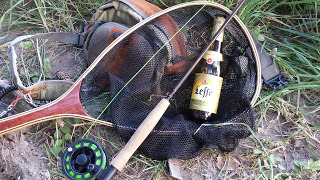 Sitting at The Bridge restaurant on the Kris River in Oradea, Romania back in 2011, drinking Leffe Blonde Beer, I could only dream of wading into the cold Carpathian runoff with a rod in hand. Wide and dark, the water ran from the heights of northern Romania into Transylvania, a region stained red with blood from Vlad the Impaler’s thirst for violence. What sort of fish ran in this river, I wondered? How could they be caught? Who before me had fished in this very spot?
Sitting at The Bridge restaurant on the Kris River in Oradea, Romania back in 2011, drinking Leffe Blonde Beer, I could only dream of wading into the cold Carpathian runoff with a rod in hand. Wide and dark, the water ran from the heights of northern Romania into Transylvania, a region stained red with blood from Vlad the Impaler’s thirst for violence. What sort of fish ran in this river, I wondered? How could they be caught? Who before me had fished in this very spot? So it was only right and proper that when me and the boys pulled up to the Cispus River to fly fish for Coho Salmon on an early August evening towards the end of 2016 that we began the enterprise with a toast of Leffe, remembrances of old, promises of the new. Kurt (repeat offender in my fishing blogs), Brad, Justin and I clinked bottles and laughed, nothing but expectations and promises of salmon grandeur before us. I joked, “Isn’t this how all backwoods horror movies begin… four friends, drinking, merry, alone, out in the wilderness?” We laughed even more, just as the doomed characters in a movie would have laughed, right before they were picked off one by one. That was a moment… a certified moment. Then we got serious, attending to our gear, preparing, readying ourselves, now individual fishermen keen to conquer the river and its progeny, as much hunters as we were fishermen.
I had never fly fished for salmon before. In fact, I could count on one hand the number of fish I’d caught on a fly rod; all small rainbow trout. So my desire would have to rise above my lack of experience. I could have spin fished. God knows I’d earned several Master’s Degrees in that over a lifetime, but I was determined to fly fish. I was determined to learn the old sport, elevate my skill, and become someone who could populate a Norman Maclean or Ernest Hemingway tale without feeling guilty for being there. So, with my 4-piece Echo Solo rod in hand, I trod upriver, searching for a likely spot, whatever a likely spot looked like.
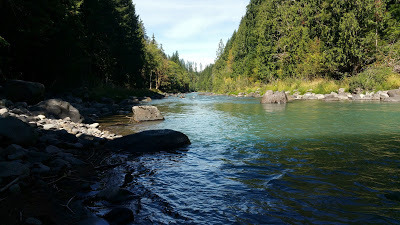 I’d never seen Salmon in a river before. While I’d fished and caught salmon on the Columbia River, that revered body as wide and as deep as a good woman’s soul, I’d never seen them near the surface. The only way I saw a salmon on the Columbia was when I’d been able to land a twenty-five pound monster in a boat (thank you Chuck). So when I turned a corner of the Cispus, the sun falling behind me, turning the tips of the waves and rivulets into silver daggers, and beheld half-a-dozen salmon laddering up some rapids into a pool, by heart caught in my throat. And as much cliché as that sounds, that’s exactly what happened as you of the salmon river fishing brother and sisterhood can attest.
I’d never seen Salmon in a river before. While I’d fished and caught salmon on the Columbia River, that revered body as wide and as deep as a good woman’s soul, I’d never seen them near the surface. The only way I saw a salmon on the Columbia was when I’d been able to land a twenty-five pound monster in a boat (thank you Chuck). So when I turned a corner of the Cispus, the sun falling behind me, turning the tips of the waves and rivulets into silver daggers, and beheld half-a-dozen salmon laddering up some rapids into a pool, by heart caught in my throat. And as much cliché as that sounds, that’s exactly what happened as you of the salmon river fishing brother and sisterhood can attest.Busy with laddering and spawning, they ignored me even as I approached, more goggle-eyed school boy than experienced fisherman. After a minute of reverence and confusion as to what I should be doing, I selected a fly with red, green, and black coloring. I don’t know what it was called, but Kurt said it was tied by a local guy who knew these waters. Assured the knot was perfect, I unloaded some line, then tossed the fly above roiling salmon and let it drift.
Bam! My father had told me over the years about his experience Steelhead fishing in Wisconsin when he was in college. He'd often reminisce about how the fish would strike and then take off like a freight train. This was another cliché proven true, because that salmon grabbed my fly and headed up river like the Chattanooga Choo Choo on methamphetamine chased by an angry battalion of highway patrolmen. I kept my left hand grabbing the line, so the fish was unable to engage the drag. The line grew taught, then stretched, then snapped.
Oh - Period - My - Period - God - Period.
I immediately realized what I’d done, but that didn’t do much to fill the hollow that grew in my gut.
That fish… that salmon… well, it was immense.

I shook my head to clear it, then with shaking hands, opened my gear and selected another fly, this one green and black. I’d thought that maybe I might find a salmon or two, but was really here to fish for cutthroat trout. That I’d stumbled into a mess of salmon was beyond anything I’d ever dreamed, standing there just moments ago, Leffe in hand. I had trouble controlling my breathing. It didn’t help that out of the corner of my eye I could see their backs breaking the water as they slashed back and forth, eager to reach higher elevations to spawn and fertilize. My eyes were having trouble seeing, even with the magnifiers I slid onto the bill of my hat. My hands were still shaking. I closed one eye, then the other. Sweat beaded into them. I was like a blind man trying to slide my tippet through the eye of the fly. It took twenty minutes that was really five and three miss-ties to get the fly ready.
Five minutes later I was into another fish. For fourteen minutes I fought the damned beast. I learned more about drag and playing a big fish in those fourteen minutes than I had the entire time I’d been fly fishing. One moment of not paying attention and it leaped, gave me the same dour look I’d seen from my former mother in law on too many occasions, then shook free of my fly.
Damn. That was two. And during those minutes, I discovered I had a problem. My tackle was too light. I was trying to catch fifteen- to twenty-pound salmon on 5wt tackle. That was no less true on the next salmon that took the fly. For forty-four minutes we fought… well, that’s perhaps an exaggeration. I tugged and held. It moved a few inches right or left. And we stayed that way. My tackle wouldn’t move it. God bless my rod, but it didn’t have enough power. Then the Salmon decided it had had enough fun playing with me, surged forward, and even with my drag, it moved fast enough to separate me from yet another fly and yet another fish. Where the first two salmon were lean and thick, this hog was a beast and my gear was no match for it.
 Earlier I’d mentioned that I’d learned more in those fourteen minutes than I had the entire time I’d been fly fishing. Well, during those forty-four minutes with that beast, I'd received my Master’s Degree in Cispus River Coho Salmon Fishing Cum Laude and now was the time to prove it.
Earlier I’d mentioned that I’d learned more in those fourteen minutes than I had the entire time I’d been fly fishing. Well, during those forty-four minutes with that beast, I'd received my Master’s Degree in Cispus River Coho Salmon Fishing Cum Laude and now was the time to prove it.But the sun was going down. It shone just above the horizon of the trees, blinding me when I looked that way. In the golden shade of some great trees near by, the water dappled with spears of the dying day with caddis flies swarming above. I selected a #12 Caddis. Big for a trout, but it seemed about right for these immense salmon. I moved down to the lower pool. I cast once. Twice. And on the third cast, a salmon sucked down my fly. When I set it, the fly lodged behind the armor of its hinged jaw—true a hook set as ever was.
Ten minutes went by. Ten minutes of my dissertation in Cispus River Coho Salmon Fly fishing. I was tested on drag, on rod tip placement, on when to load line and when to unload. The river asked me question after question and I answered them. I heard honking in the distance, then shouting, then loud music. My friends wanted to go. It was time to leave.
“Sorry boys,” I said to the universe. “I can’t come quite yet,” my own replacement for the song Beth-- made famous by Kiss on their 1976 Destroyer album. “Beth, I hear you calling. I can’t come home right now. Me and the boys are playing, and we just can’t find the sound. Just a few more hours and I'll be right home to you. I think I hear them calling. Oh Beth what can I do.”
Had this fish been my first, I would have lost it. The same could be said with my second and third. But I’d been schooled by the river. The salmon were harsh masters and had given me hard lessons. Five minutes later, I netted the top half of the salmon and grabbed the bottom half. In one heroic heave, I brought the scarred and lithe beast to shore, fell on it, then lay there for a transcendental moment as I became one with every man, woman, and child who’d ever caught a massive salmon on a fly rig.
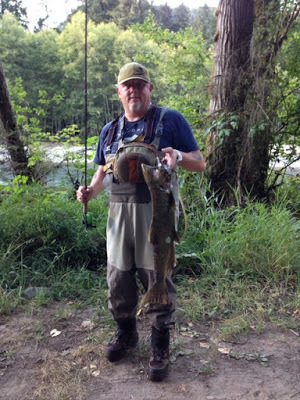 Eventually I stood, shaking. My diploma lay before me, gasping, covered in dirt and slime, dimpled and scarred from the thirty-five-mile trek from the top of the dam where it had been released. My diploma for this day was a fifteen pound twenty-nine inch coho salmon. When I was finally able to move, I broke the line, leaving the fly where it was. I shored the rest of my line, then grabbed the salmon through the jaws. Holding it at my side, the tail drug on the ground. Noticing that was yet another moment. I saw a standing pool of water separate from the river and out of respect, paused to wash the salmon clean, then headed downriver to the sounds of honking and yelling.
Eventually I stood, shaking. My diploma lay before me, gasping, covered in dirt and slime, dimpled and scarred from the thirty-five-mile trek from the top of the dam where it had been released. My diploma for this day was a fifteen pound twenty-nine inch coho salmon. When I was finally able to move, I broke the line, leaving the fly where it was. I shored the rest of my line, then grabbed the salmon through the jaws. Holding it at my side, the tail drug on the ground. Noticing that was yet another moment. I saw a standing pool of water separate from the river and out of respect, paused to wash the salmon clean, then headed downriver to the sounds of honking and yelling.Walking back to the car to my boys, having now found the sound, pole in one hand, fish in the other, was a feeling like I'd never encountered. Satisfaction. Accomplishment. Amazement. Grateful. It wasn't as simple as an old drill sergeant once said, "Success is where preparation meets opportunity." I felt more like Sir Gawain after his improbable defeat of the invincible Green Knight than I did a fisherman trying his first time to catch a salmon with a fly rod. I knew then that my walk back towards my boys, all three of them watching me, wondering where I was, then seeing me and wondering what the hell that thing was that I was holding firmly in my left hand, then closer, realizing it was a fish, then not just a fish but a salmon, and wondering, for a moment being me in my triumph, was yet another certified moment.
“Some people go their whole lives without ever catching a salmon on a fly rod,” Kurt said to me.
I glowed with accomplishment and thanked the river for her lessons in fishing.
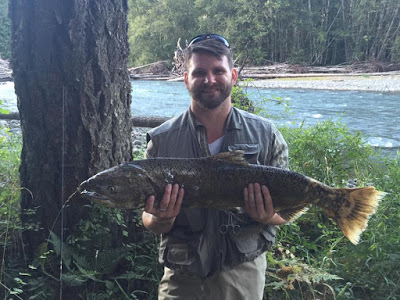 After pictures and several mandatory retellings of my fish story and those of my boy Brad, who’d caught a salmon just a bit larger on a spin fishing rig, we all found ourselves in a moment of silence. A moment filled with what could have beens, what had beens, and remembrances of similar moments, each of us had shared individually or together as we'd fished this great wild world. Then Kurt broke the silence. He brought out the rest of the Leffe Blonde. We opened them and drank. We’d found our sound… the river, forever running and falling, and our heartbeats, still moving fast with the epic thrill of our salmon hunt, and our blood through our temples, reminding us how alive we were, at this moment, together.
After pictures and several mandatory retellings of my fish story and those of my boy Brad, who’d caught a salmon just a bit larger on a spin fishing rig, we all found ourselves in a moment of silence. A moment filled with what could have beens, what had beens, and remembrances of similar moments, each of us had shared individually or together as we'd fished this great wild world. Then Kurt broke the silence. He brought out the rest of the Leffe Blonde. We opened them and drank. We’d found our sound… the river, forever running and falling, and our heartbeats, still moving fast with the epic thrill of our salmon hunt, and our blood through our temples, reminding us how alive we were, at this moment, together.-Finis-
Some more pictures
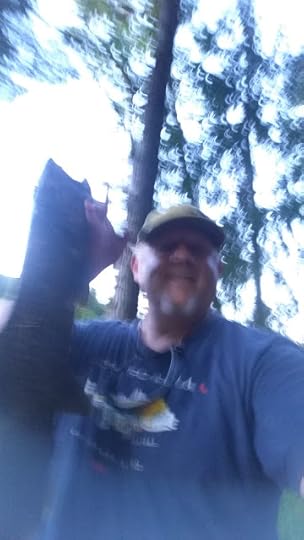 A selfie of me and the fish. It wasn't moving, I was just too excited. I think I was actually vibrating.
A selfie of me and the fish. It wasn't moving, I was just too excited. I think I was actually vibrating.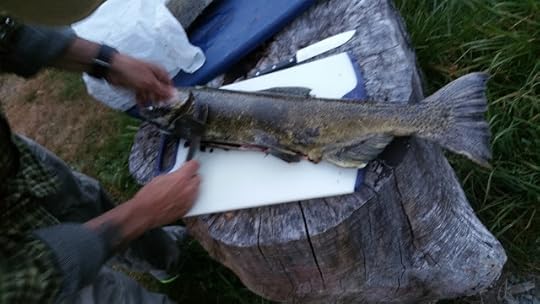 Kurt filleting one of the fish at his cabin. We later smoked them.
Kurt filleting one of the fish at his cabin. We later smoked them. 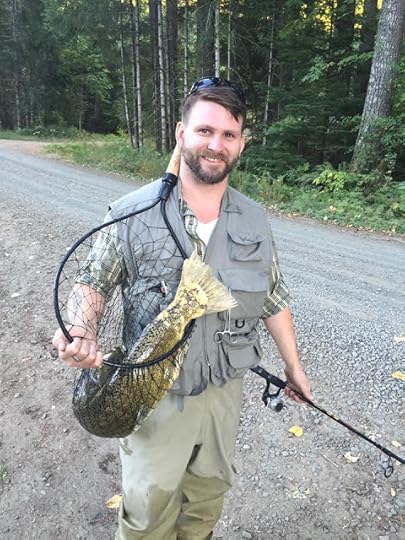 Brad with another picture of his fish.
Brad with another picture of his fish.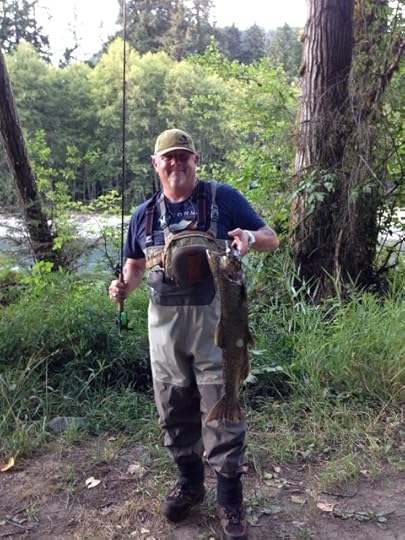 Another picture of the salmon.
Another picture of the salmon. 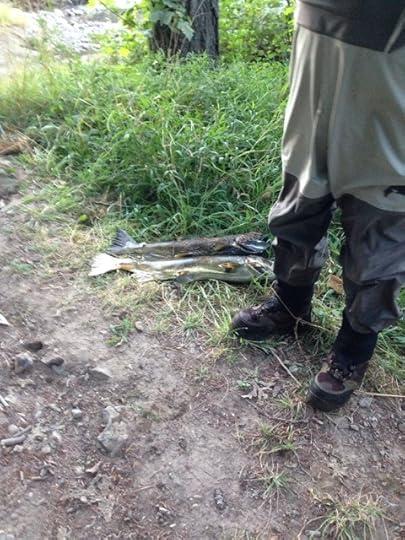 They're almost the same size but Brad's edged mine out by about 2 inches and a pound.
They're almost the same size but Brad's edged mine out by about 2 inches and a pound.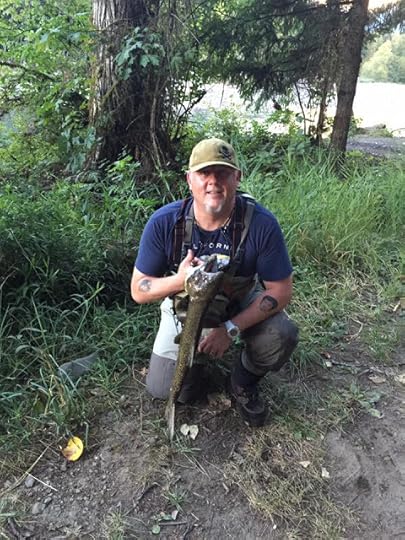
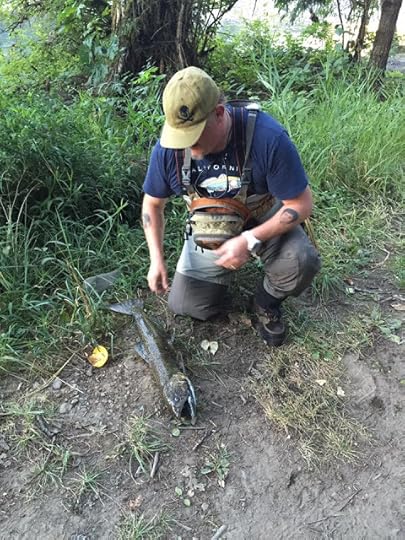
Published on August 29, 2016 17:09
August 25, 2016
Fan Letter Thanking Me -- PTSD and Self Harm
Sometimes you get a fan letter that is more than just "you write good stuff, thanks." I get versions of this all the time and am always appreciative when it happens. As you writers know (and this may be a secret or not for readers), as narcissistic as us writers are, we also have moments in writing where we doubt our abilities... moments when we're convinced that we suck and have no right writing anything except a shopping list.
Then there are those rare times when you get a fan letter that transcends everything else you've ever received. I was sent one yesterday through my website. I read it twice before I wholly understood the gravitas of the man's words. I admit I cried. It was almost too much. You see, I don't write to change the world or change a person. I write to entertain, first and foremost. If I achieve that then I did what I intended. Often, I want a reader to think and perhaps understand. Those are secondary goals and if I achieve that, then I know I've done something real good. But to be told that my writing changed a life... maybe saved a life, that's something altogether different. It's frankly, humbling, because no writer, regardless of their narcissism, ever writes a fiction novel intent on saving lives.
 Grunt Life, Grunt Traitor, and the soon to be published Grunt Hero (collectively called the Grunt Series) is an alien invasion story about a small group of grunts who all have PTSD to varying degrees. Because I wrote the first book when I was stationed in Afghanistan, I think I was able to tap into the PTSD theme better than had I not been in Afghanistan. In a war zone, everyone has PTSD. EVERYONE. Me included. So the suffering and symptoms I wrote was real. It was raw. It rang so true that my superb editor at Solaris Books, Jonathan Oliver, and rightly so, expressed his concern that the book(s) might be a trigger. It worried me as well. Neither of us wanted to do harm. We wanted only to entertain and maybe achieve those other things. We discussed the nature of Grunt Life and it's themes. Although we never voiced it, I think each of us knew that if either one of us had said to the other, 'maybe we shouldn't publish this," that we wouldn't have. And that's a bold statement I've never made in public before, but I believe it to be ultimately true. Jon cares about what he publishes. I care about what I write. We live by the mantra- Do No Harm.
Grunt Life, Grunt Traitor, and the soon to be published Grunt Hero (collectively called the Grunt Series) is an alien invasion story about a small group of grunts who all have PTSD to varying degrees. Because I wrote the first book when I was stationed in Afghanistan, I think I was able to tap into the PTSD theme better than had I not been in Afghanistan. In a war zone, everyone has PTSD. EVERYONE. Me included. So the suffering and symptoms I wrote was real. It was raw. It rang so true that my superb editor at Solaris Books, Jonathan Oliver, and rightly so, expressed his concern that the book(s) might be a trigger. It worried me as well. Neither of us wanted to do harm. We wanted only to entertain and maybe achieve those other things. We discussed the nature of Grunt Life and it's themes. Although we never voiced it, I think each of us knew that if either one of us had said to the other, 'maybe we shouldn't publish this," that we wouldn't have. And that's a bold statement I've never made in public before, but I believe it to be ultimately true. Jon cares about what he publishes. I care about what I write. We live by the mantra- Do No Harm.
We ultimately decided to let it roll off the presses. The first print run sold out before it hit the streets. We held our breaths as the reviews began to pour in. And they were great. They got what we'd intended. Never did a single reviewer condemn us for capitalizing in on suffering, instead they all mentioned how real and raw the narrative conveyed PTSD and its symptoms and how it made them realize things they'd never known.
Collective exhalations of relief.
Back to the email. I didn't know whether or not I should mention it in passing or provide it (names redacted of course) in whole. I didn't want to use it as an advertisement. I could never monetize someone's misery. That's not what this blog post is about at all. What I was thinking was this: maybe if I was able to help one person, perhaps others could be helped, not by buying any of my books, but by reading the email I received.
Sort of like passing it on. Paying it forward.
Here's the email:
I am honored and humbled to have been able to help. I don't know what else to say.
Don't go out and buy any of my books. If you feel the need to spend money, why not go out and spend the money you'd spend on one of my books by giving it to a local veteran's groups or a PTSD charity. Here's a link to the National Center for PTSD where you can find more information. Here's also a link to a website providing access to Self-Injury Outreach and Support. Please go there if you need to or if you know someone with a problem.
I hope this blog post helps.
Pass it on if you think you need to.
Be well.
Then there are those rare times when you get a fan letter that transcends everything else you've ever received. I was sent one yesterday through my website. I read it twice before I wholly understood the gravitas of the man's words. I admit I cried. It was almost too much. You see, I don't write to change the world or change a person. I write to entertain, first and foremost. If I achieve that then I did what I intended. Often, I want a reader to think and perhaps understand. Those are secondary goals and if I achieve that, then I know I've done something real good. But to be told that my writing changed a life... maybe saved a life, that's something altogether different. It's frankly, humbling, because no writer, regardless of their narcissism, ever writes a fiction novel intent on saving lives.
 Grunt Life, Grunt Traitor, and the soon to be published Grunt Hero (collectively called the Grunt Series) is an alien invasion story about a small group of grunts who all have PTSD to varying degrees. Because I wrote the first book when I was stationed in Afghanistan, I think I was able to tap into the PTSD theme better than had I not been in Afghanistan. In a war zone, everyone has PTSD. EVERYONE. Me included. So the suffering and symptoms I wrote was real. It was raw. It rang so true that my superb editor at Solaris Books, Jonathan Oliver, and rightly so, expressed his concern that the book(s) might be a trigger. It worried me as well. Neither of us wanted to do harm. We wanted only to entertain and maybe achieve those other things. We discussed the nature of Grunt Life and it's themes. Although we never voiced it, I think each of us knew that if either one of us had said to the other, 'maybe we shouldn't publish this," that we wouldn't have. And that's a bold statement I've never made in public before, but I believe it to be ultimately true. Jon cares about what he publishes. I care about what I write. We live by the mantra- Do No Harm.
Grunt Life, Grunt Traitor, and the soon to be published Grunt Hero (collectively called the Grunt Series) is an alien invasion story about a small group of grunts who all have PTSD to varying degrees. Because I wrote the first book when I was stationed in Afghanistan, I think I was able to tap into the PTSD theme better than had I not been in Afghanistan. In a war zone, everyone has PTSD. EVERYONE. Me included. So the suffering and symptoms I wrote was real. It was raw. It rang so true that my superb editor at Solaris Books, Jonathan Oliver, and rightly so, expressed his concern that the book(s) might be a trigger. It worried me as well. Neither of us wanted to do harm. We wanted only to entertain and maybe achieve those other things. We discussed the nature of Grunt Life and it's themes. Although we never voiced it, I think each of us knew that if either one of us had said to the other, 'maybe we shouldn't publish this," that we wouldn't have. And that's a bold statement I've never made in public before, but I believe it to be ultimately true. Jon cares about what he publishes. I care about what I write. We live by the mantra- Do No Harm.We ultimately decided to let it roll off the presses. The first print run sold out before it hit the streets. We held our breaths as the reviews began to pour in. And they were great. They got what we'd intended. Never did a single reviewer condemn us for capitalizing in on suffering, instead they all mentioned how real and raw the narrative conveyed PTSD and its symptoms and how it made them realize things they'd never known.
Collective exhalations of relief.
Back to the email. I didn't know whether or not I should mention it in passing or provide it (names redacted of course) in whole. I didn't want to use it as an advertisement. I could never monetize someone's misery. That's not what this blog post is about at all. What I was thinking was this: maybe if I was able to help one person, perhaps others could be helped, not by buying any of my books, but by reading the email I received.
Sort of like passing it on. Paying it forward.
Here's the email:
Dear Mr. Ochse, I recently discovered your excellent book Grunt Life and whilst I was reading it I came across something that has transformed my relationship with my daughter (redacted). You see she was a self harmer and I never really understood what caused her to keep hurting herself. When I read the passage about Aquinas and the need for her to self harm I finally understood what my daughter was going through and why. I took the book upstairs and just said to her please read that passage and then tell me what you think. After reading it she said that it described how she had felt when she was down and it was right about blaming herself for problems in her life and feeling guilty about them. I will never know how you managed to get such a complete and accurate description of the illness but regardless I thank you from the bottom of my heart for the chance to understand it. Yours sincerely, XXXXX
I am honored and humbled to have been able to help. I don't know what else to say.
Don't go out and buy any of my books. If you feel the need to spend money, why not go out and spend the money you'd spend on one of my books by giving it to a local veteran's groups or a PTSD charity. Here's a link to the National Center for PTSD where you can find more information. Here's also a link to a website providing access to Self-Injury Outreach and Support. Please go there if you need to or if you know someone with a problem.
I hope this blog post helps.
Pass it on if you think you need to.
Be well.
Published on August 25, 2016 10:55
August 8, 2016
My Tribute to the Crown Princess of Badassery - Jessie Graff
Or should it be an ode.
Perhaps I should wax poetic, setting my words a tumble just as she herself does across the screen during America Ninja Warrior.
Or maybe it should be a love letter to her spirit, free, prepared, open for anything, even a Chicken Fight in the middle of nowhere, car explosions like love bombs from the heart.
or even better Haiku:
Badass TalentedChick sucker punches life andeats it in huge gulps.
or
Sidekick to the face
Great White Sharks inquire within
Sidekick to the face
Who is this person you ask?
The Lords of Wikipedia say: Jessica "Jessie" Graff (born January 12, 1984) is a professional stunt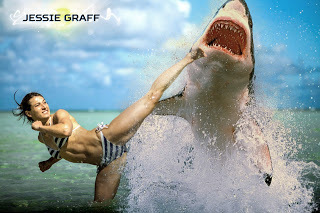 woman and actress. She is a black belt in Tae Kwon Do, a black sash in Kung Fu, and is trained in five other styles of martial arts. She is also a championship pole vaulter and competitive gymnast. She is famous for being the first woman to qualify for the city finals on the fifth season of American Ninja Warrior. She was also a contestant on Wipeout in 2008. In season 8 of American Ninja Warrior, in the Los Angeles qualifying round, she became the first woman in American Ninja Warrior history to make it up the new 14 1/2-foot Warped Wall. Along with her, a second woman in the Los Angeles qualifying round, professional rock climber Natalie Duran, who finished 19th (but did not complete the course), moved on to the city finals. This was the first time two women made it into the Top 30. Later on season 8 of American Ninja Warrior, in the Los Angeles city finals, Graff finished second, breaking her own record for the highest finish by a woman in a city competition.
woman and actress. She is a black belt in Tae Kwon Do, a black sash in Kung Fu, and is trained in five other styles of martial arts. She is also a championship pole vaulter and competitive gymnast. She is famous for being the first woman to qualify for the city finals on the fifth season of American Ninja Warrior. She was also a contestant on Wipeout in 2008. In season 8 of American Ninja Warrior, in the Los Angeles qualifying round, she became the first woman in American Ninja Warrior history to make it up the new 14 1/2-foot Warped Wall. Along with her, a second woman in the Los Angeles qualifying round, professional rock climber Natalie Duran, who finished 19th (but did not complete the course), moved on to the city finals. This was the first time two women made it into the Top 30. Later on season 8 of American Ninja Warrior, in the Los Angeles city finals, Graff finished second, breaking her own record for the highest finish by a woman in a city competition.
Bottom line is she's a stunt woman. She's been on Sons of Anarchy and Supergirl. She'll do anything. She doesn't care. In a recent Esquire article she said, "I'm just told to be there and I'll find out I'm doing doughnuts in the desert or rappeling down a building or fighting people." What an amazing job.
I'm often asked if I could do it all over again, what would I do. A secret corner of my soul says parkour. I can still remember dressed up in ninja clothes running down the street, diving over hedges, running up trees and cars, diving, somersaulting, just having the time of my life. The freedom of it, the knowing that there is nothing you can't do, is unimaginable.
So whenever I see Jessie, I think of this freedom, this excellence, this ability to overcome physical limitations and dominate that which comes before you.
Perhaps I should wax poetic, setting my words a tumble just as she herself does across the screen during America Ninja Warrior.
Or maybe it should be a love letter to her spirit, free, prepared, open for anything, even a Chicken Fight in the middle of nowhere, car explosions like love bombs from the heart.
or even better Haiku:
Badass TalentedChick sucker punches life andeats it in huge gulps.
or
Sidekick to the face
Great White Sharks inquire within
Sidekick to the face
Who is this person you ask?
The Lords of Wikipedia say: Jessica "Jessie" Graff (born January 12, 1984) is a professional stunt
 woman and actress. She is a black belt in Tae Kwon Do, a black sash in Kung Fu, and is trained in five other styles of martial arts. She is also a championship pole vaulter and competitive gymnast. She is famous for being the first woman to qualify for the city finals on the fifth season of American Ninja Warrior. She was also a contestant on Wipeout in 2008. In season 8 of American Ninja Warrior, in the Los Angeles qualifying round, she became the first woman in American Ninja Warrior history to make it up the new 14 1/2-foot Warped Wall. Along with her, a second woman in the Los Angeles qualifying round, professional rock climber Natalie Duran, who finished 19th (but did not complete the course), moved on to the city finals. This was the first time two women made it into the Top 30. Later on season 8 of American Ninja Warrior, in the Los Angeles city finals, Graff finished second, breaking her own record for the highest finish by a woman in a city competition.
woman and actress. She is a black belt in Tae Kwon Do, a black sash in Kung Fu, and is trained in five other styles of martial arts. She is also a championship pole vaulter and competitive gymnast. She is famous for being the first woman to qualify for the city finals on the fifth season of American Ninja Warrior. She was also a contestant on Wipeout in 2008. In season 8 of American Ninja Warrior, in the Los Angeles qualifying round, she became the first woman in American Ninja Warrior history to make it up the new 14 1/2-foot Warped Wall. Along with her, a second woman in the Los Angeles qualifying round, professional rock climber Natalie Duran, who finished 19th (but did not complete the course), moved on to the city finals. This was the first time two women made it into the Top 30. Later on season 8 of American Ninja Warrior, in the Los Angeles city finals, Graff finished second, breaking her own record for the highest finish by a woman in a city competition.Bottom line is she's a stunt woman. She's been on Sons of Anarchy and Supergirl. She'll do anything. She doesn't care. In a recent Esquire article she said, "I'm just told to be there and I'll find out I'm doing doughnuts in the desert or rappeling down a building or fighting people." What an amazing job.
I'm often asked if I could do it all over again, what would I do. A secret corner of my soul says parkour. I can still remember dressed up in ninja clothes running down the street, diving over hedges, running up trees and cars, diving, somersaulting, just having the time of my life. The freedom of it, the knowing that there is nothing you can't do, is unimaginable.
So whenever I see Jessie, I think of this freedom, this excellence, this ability to overcome physical limitations and dominate that which comes before you.
Published on August 08, 2016 12:43
The Art of the Nap
Dwight Garner, in the September 2016 Esquire magazine, writes an article about napping called Second Only to Sex. It's funny, when I read the title, I was like... fishing? Then I thought, no, that's a dead on tie. Then what? As it turned out it's napping. The Pre-40 version of me would have agreed. The post-50 version of me agrees most of the time, but also thinks that napping might be as important as fishing. In fact, I remember that scene in A River Runs Through It, towards the end, where Tom Skerritt fishes, then naps, equally happy slumbering as he was chasing the long muscled trout in the great Montana river, while his sons do nothing but fish, leaping from stone to stone as they attempt to outmatch.
Who's happier?
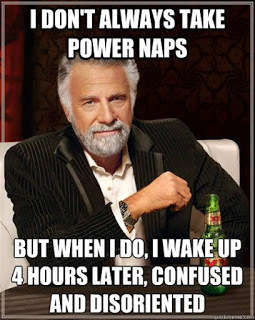 Who's more fulfilled?
Who's more fulfilled?
All of them are, yet I daresay, now that I've learned the art of the nap, perhaps the rambunctious boys might like a short, reclined respite after all their leaping and catching.
I have a chair in my living room. I call it my reading chair, but if I'm to be honest with the universe it's also a napping chair. I know that sometime during my reading that I will fall asleep and slumber for a time. Nothing deep. I'm still able to hear the occasional car rumble by or the dogs shifting in their sleep at my feet. Still, the sleep is such an assuagement that it has become something I look forward to. I don't fight it. I welcome it. I read. I nap. I read again. In fact, if I sit in my chair and don't nap, it feels awkward, as if I'd been out on a date with all the expectations therein, only to return home without even a peck on the cheek, a hug, or an exchange of numbers.
Says Vladimir Nabokov, “sleep is the most moronic fraternity in the world, with the heaviest dues and the crudest rituals. It is a mental torture I find debasing... I simply cannot get used to the nightly betrayal of reason, humanity, genius.” Of course, Vladimir also wrote, “Lolita, light of my life, fire of my loins. My sin, my soul. Lo-lee-ta: the tip of the tongue taking a trip of three steps down the palate to tap, at three, on the teeth." Perhaps that's the reason he didn't want to sleep... his little Lolita. Given the choice... well, that's for another article.
Garner rightfully points out that a stigma is attached to napping. The younger version of me imagined an older man, perhaps a pipe, perhaps a cat, napping, almost doddering through his day. But it's not like that. I feel refereshed after a nap. My body becomes emboldened.

Philip Roth said it perfectly, capturing that a nap means. "The best part of it is when you wake up, for that first 15 seconds, you have no idea where you are. You're just alive. That's all you know. And it's bliss, it's absolute bliss."
The idea of just being, without the weight of responsibility, or the ties of duty of family or society... just being. Maybe that's the crystallization of the nap. The bliss. The being.
Napping is an important part of my existence. If for but a few moments every day I am free from everything, how much more would I appreciate the moments of my waking? I'm reminded of that time my wife and I stayed at a B&B in Valencia, nationally-mandated siestas in the front room after a short lunch of wine and arctic char sandwiches, the sun which lumbering across the church plaza warming us as we napped arm in arm on a down filled daybed. Then to finally wake, sluff off the static cling of our dreams, then to rejoin an entire country who was now awake, re-energized, and ready to rekindle the rest of their day, eating, drinking, talking, living until that time in the morning they could sleep again.
Yes. the Spanish have it right.
As do I, now a firm supporter and appreciative of the nap and everything it adds to my life.
What are your thoughts on the nap? Do you do it? Are you for it? Are you against it, like Thomas Edison, proclaiming that "sleep is an absurdity... a bad habit?"
Who's happier?
 Who's more fulfilled?
Who's more fulfilled?All of them are, yet I daresay, now that I've learned the art of the nap, perhaps the rambunctious boys might like a short, reclined respite after all their leaping and catching.
I have a chair in my living room. I call it my reading chair, but if I'm to be honest with the universe it's also a napping chair. I know that sometime during my reading that I will fall asleep and slumber for a time. Nothing deep. I'm still able to hear the occasional car rumble by or the dogs shifting in their sleep at my feet. Still, the sleep is such an assuagement that it has become something I look forward to. I don't fight it. I welcome it. I read. I nap. I read again. In fact, if I sit in my chair and don't nap, it feels awkward, as if I'd been out on a date with all the expectations therein, only to return home without even a peck on the cheek, a hug, or an exchange of numbers.
Says Vladimir Nabokov, “sleep is the most moronic fraternity in the world, with the heaviest dues and the crudest rituals. It is a mental torture I find debasing... I simply cannot get used to the nightly betrayal of reason, humanity, genius.” Of course, Vladimir also wrote, “Lolita, light of my life, fire of my loins. My sin, my soul. Lo-lee-ta: the tip of the tongue taking a trip of three steps down the palate to tap, at three, on the teeth." Perhaps that's the reason he didn't want to sleep... his little Lolita. Given the choice... well, that's for another article.
Garner rightfully points out that a stigma is attached to napping. The younger version of me imagined an older man, perhaps a pipe, perhaps a cat, napping, almost doddering through his day. But it's not like that. I feel refereshed after a nap. My body becomes emboldened.

Philip Roth said it perfectly, capturing that a nap means. "The best part of it is when you wake up, for that first 15 seconds, you have no idea where you are. You're just alive. That's all you know. And it's bliss, it's absolute bliss."
The idea of just being, without the weight of responsibility, or the ties of duty of family or society... just being. Maybe that's the crystallization of the nap. The bliss. The being.
Napping is an important part of my existence. If for but a few moments every day I am free from everything, how much more would I appreciate the moments of my waking? I'm reminded of that time my wife and I stayed at a B&B in Valencia, nationally-mandated siestas in the front room after a short lunch of wine and arctic char sandwiches, the sun which lumbering across the church plaza warming us as we napped arm in arm on a down filled daybed. Then to finally wake, sluff off the static cling of our dreams, then to rejoin an entire country who was now awake, re-energized, and ready to rekindle the rest of their day, eating, drinking, talking, living until that time in the morning they could sleep again.
Yes. the Spanish have it right.
As do I, now a firm supporter and appreciative of the nap and everything it adds to my life.
What are your thoughts on the nap? Do you do it? Are you for it? Are you against it, like Thomas Edison, proclaiming that "sleep is an absurdity... a bad habit?"
Published on August 08, 2016 10:36
August 4, 2016
Some Current Readings: Paul Tremblay, Paul Pen, John Boden, and Rachel Autmn Deering
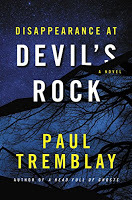 I've read a few books the last few weeks as I was traveling and wanted to share some of the best I've read.
I've read a few books the last few weeks as I was traveling and wanted to share some of the best I've read.I've known Paul Tremblay since he started writing and I got to say, I am so pleased to see him getting better and better. "Wait," you say. "Head Full of Ghosts was awesome." Yes. And Disappearance at Devils' Rock is better. Not just the story, but the narrative structure. It takes major talent to do what Paul has done-- the way he reveals story. I found myself admiring the style all the way through as well as reveling in the story. This is a must read for anyone who wants suspense... Devil's Rock abounds with suspense. Way to go Paul!
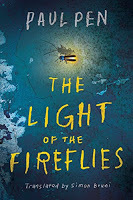
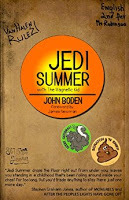 When I finished The Light of Fireflies and realized that it had been translated from Spanish to English, I was blown away. I couldn't tell. The translation was so perfect, the narrative never seemed ESL. It also explains why I'd never heard of the author. All the way through the Fireflies, I was wondering how come I've never read anything by this guy. And that's why. I don't speak Spanish... yet. What's it about? I considered comparing it to VC Andrews Flowers in the Attic, but that would be a disservice to this novel. On the surface the book is about a mostly disfigured family who lives underground, but the narrative runs far deeper than that. This is probably the best book I've read all year and I've read some amazing books thusfar (Experimental Film, Disappearance at Devil's Rock, and Mongrels being three of my highlights).
When I finished The Light of Fireflies and realized that it had been translated from Spanish to English, I was blown away. I couldn't tell. The translation was so perfect, the narrative never seemed ESL. It also explains why I'd never heard of the author. All the way through the Fireflies, I was wondering how come I've never read anything by this guy. And that's why. I don't speak Spanish... yet. What's it about? I considered comparing it to VC Andrews Flowers in the Attic, but that would be a disservice to this novel. On the surface the book is about a mostly disfigured family who lives underground, but the narrative runs far deeper than that. This is probably the best book I've read all year and I've read some amazing books thusfar (Experimental Film, Disappearance at Devil's Rock, and Mongrels being three of my highlights).While at Scares that Care Weekend in Williamsburg, I picked up a copy of John Boden's Jedi Summer with the Magnetic Kid. A narrow chapbook with a terrific cover, it drew me as a fellow child of the 80s. What the book contained were first person narrative slices of a long summer, culminating with the viewing of Return of the Jedi. I liked the story a lot and I loved the little brother feeding invisible dogs. I would have liked to see it be more than vignettes and more of a cohesive narrative. It has the potential to be incredible, sort of a High Fidelity Love Story to the Star Wars 80s. That said, what I read was wonderful.
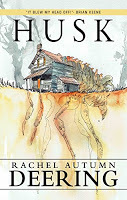 Husk was a surprise. I hadn't planned on reading it. In fact, it was foisted on handed to me just as I was leaving Scares That Care Weekend. Husk is written by Rachel Autumn Deering. She, I, and a bunch of others had spent some time together during the convention, especially the night before when she and the Irish tattoo princess Melissa Hayward produced the unscripted and unrecorded impromptu party podcast called Midnight Hamburger. Rather than review this, I'll share the IM I sent her. Now, I don't often IM authors, but because this was her first work of prose (that I know about), and as an old-timer, I wanted to share some literary advice/criticism/love... whichever is generally appropriate.
Husk was a surprise. I hadn't planned on reading it. In fact, it was foisted on handed to me just as I was leaving Scares That Care Weekend. Husk is written by Rachel Autumn Deering. She, I, and a bunch of others had spent some time together during the convention, especially the night before when she and the Irish tattoo princess Melissa Hayward produced the unscripted and unrecorded impromptu party podcast called Midnight Hamburger. Rather than review this, I'll share the IM I sent her. Now, I don't often IM authors, but because this was her first work of prose (that I know about), and as an old-timer, I wanted to share some literary advice/criticism/love... whichever is generally appropriate."This morning, sitting in the sun room of a 200 year old home that rests on a prominence of the Potomac River, still basking in the glow of a super-mega-cool-fucking convention and drinking coffee, I read Husk. I had no expectations, no thoughts to what it was going to be about, nor do I really know you except for Midnight Hamburger (we'll always have Midnight Hamburger), so it was with exceptional delight that I found the novella eminently engaging. Your writing is a glowing example of Kentucky Hollows Gothic and your treatment of PTSD is near on perfect. There were sentences I re-read because of your capacity to sew the perfect words together. I'm not sure if you know it, but the Sci Fi series I'm currently writing for Solaris is all about PTSD. Other than having a bit of it myself, I've been a student of the vicious beast for several years now. You did well in showing and not telling on how it can grip a man and not let go. And then the end... so damned Shakepearian... so damned O'Henryian. The impact was there. If you ever decide to turn this into a novel-length piece, which I think it should be, the impact would be even more as you shore the beach of their relationship, just as he's simultaneously trying to bestill the beast that's on him, be it real, or imaginary. Yes. Husk is great. I can't wait to read what else slithers out of your keen and cool imagination. Be well."
Have you read these? What are your thoughts? If you haven't read these, please do! They are awesome and I wasn't even paid to say so.
Published on August 04, 2016 11:33
July 9, 2016
The Poetry and Science of Nisqually Fly Fishing
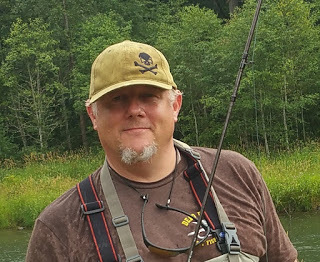 I'm new to fly fishing but not new to fishing. When I was in Afghanistan, I wrote an essay called I Used to Be Fisherman, where I vowed to return to fishing and I did. Growing up catching crappie from a bamboo pole when I was three, to fishing for trout in the Black Hills with worms and corn, to fishing for trout everywhere with my secret suite of rooster tails, I've caught enough trout in my life to feed everyone I've ever met at least twice over. But those are numbers and I guess when you get to my age, numbers no longer matter.
I'm new to fly fishing but not new to fishing. When I was in Afghanistan, I wrote an essay called I Used to Be Fisherman, where I vowed to return to fishing and I did. Growing up catching crappie from a bamboo pole when I was three, to fishing for trout in the Black Hills with worms and corn, to fishing for trout everywhere with my secret suite of rooster tails, I've caught enough trout in my life to feed everyone I've ever met at least twice over. But those are numbers and I guess when you get to my age, numbers no longer matter. What matters to me is the contest. Right now, I feel confidant that I can walk up to any trout-laden body of water and catch a trout within minutes using a rooster tail. I've caught them from thirty inches on down, in streams no wider than the desk I'm typing this on, to wide rivers I can barely see across, to lakes that seemed more like oceans. Sure, I can catch them, but it's just no contest. I want to challenge myself. I want to put myself in the most difficult position to catch a fish then do it. Little did I know I'd have to embrace both poetry and science to do it.
 What matters to me is the science. I asked my friend Kurt what flies I should bring when we fished the Nisqually. He didn't know and that he'd see what sort of bugs were on the river. Bugs. I've loved playing with bugs since I was a wee tyke and now I get to play with them again. Kurt's response reminded me of Paul in Norman Maclean's semi-autobiographical novella A River Runs Through It-- that fabulous tale written about a family living in early 20th century Montana whose true religion was fly fishing. Paul believed in having the generals, those flies that are are the most common because nine out of ten times, those are what you're going to need. But there was a part in the novella also where the narrator (the author) began catching heaps of trout, leaving Paul skunked because the narrator had some exotics. As it turned out, there was a stonefly hatch and the narrator happened to have some with him. I can't tell you how much time I spent researching online what magical flies to bring and use on the Nisqually, and in the end, the science of it was nothing more than observing the nuances of nature... something the old spinner fisherman in me would have ignored on my quest to achieve a number.
What matters to me is the science. I asked my friend Kurt what flies I should bring when we fished the Nisqually. He didn't know and that he'd see what sort of bugs were on the river. Bugs. I've loved playing with bugs since I was a wee tyke and now I get to play with them again. Kurt's response reminded me of Paul in Norman Maclean's semi-autobiographical novella A River Runs Through It-- that fabulous tale written about a family living in early 20th century Montana whose true religion was fly fishing. Paul believed in having the generals, those flies that are are the most common because nine out of ten times, those are what you're going to need. But there was a part in the novella also where the narrator (the author) began catching heaps of trout, leaving Paul skunked because the narrator had some exotics. As it turned out, there was a stonefly hatch and the narrator happened to have some with him. I can't tell you how much time I spent researching online what magical flies to bring and use on the Nisqually, and in the end, the science of it was nothing more than observing the nuances of nature... something the old spinner fisherman in me would have ignored on my quest to achieve a number.

What matters to me is the poetry. Some might call it technique, but to me, watching a fisherman manipulate the fly through the air along thirty feet of fly line is pure poetry. I could stand and watch it all day. In fact, at the end of our fishing day, I watched Kurt fish a riffle I wasn't good enough-- poetic enough-- to reach through my technique. I was satisfied to stand back and watch, part in admiration and part in learning, experiencing his slower poetry in motion. I remembered the first half hour on the river. I thought my line was messed up, but he came over and showed me that I was casting too quickly. By the end of the day, my improvement was such that I'd probably tripled my casting distance... but it still wasn't enough. But that's okay. There'll be another time and another after that where I can try and perfect my poetry.
The Nisqually presented itself to us that day as a rumbling slash of silver through moss-covered Washington forest beneath mottled gray skies. We were still on the military base, so access was restricted to the area. As such, we didn't see another fisherman all day. I remember standing on the bank and staring at the river as a whole and seeing it as one thing. Then once I stepped into it, I saw it completely differently. Places I'd thought unfishable, suddenly became possible lay-bys for fish. I crept into the river, careful not to splash and found my first spot. After a life lesson in how to cast terribly, I soon figured out how to get the fly out about twenty feet. For most of the day, that was the best I could do. Still, in the second hour, I floated a rather small bi-color caddis with black on top and brown on the bottom over a promising riffle and was delighted when a trout shrugged into it, ran with it, then graciously allowed me to catch it, snuggling itself into my net, both of us hyperventilating. I actually let out a whoop! That nine inch rainbow was the first fish I'd ever caught on a fly rod in my life. At that moment, whether it had been three inches or three feet, it would always be my first and as such, I let it return to the river with its own life lesson.
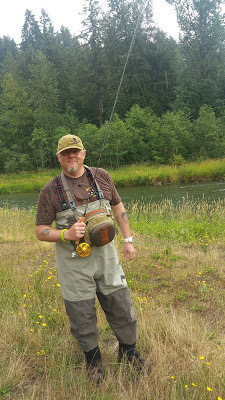 I fished for another forty minutes, trying different black colored flies because I saw black fly hatches in the shallows. Kurt was sharing a new fly with me when I had a strike on a gnat I was running. Had I been paying attention, I might have landed it. I probably should have kept fishing with the gnat, but I switched flies to what Kurt gave me and BAM. Within two minutes, I had my second fish of the day. This one almost eleven inches. After landing it, I held it in my hands, coddling it until it regained its bearings, then it floated a moment, then shot for the depths. Over the next several hours I had several more strikes, but my inexperience kept me from landing whatever fish I'd temporarily fooled.
I fished for another forty minutes, trying different black colored flies because I saw black fly hatches in the shallows. Kurt was sharing a new fly with me when I had a strike on a gnat I was running. Had I been paying attention, I might have landed it. I probably should have kept fishing with the gnat, but I switched flies to what Kurt gave me and BAM. Within two minutes, I had my second fish of the day. This one almost eleven inches. After landing it, I held it in my hands, coddling it until it regained its bearings, then it floated a moment, then shot for the depths. Over the next several hours I had several more strikes, but my inexperience kept me from landing whatever fish I'd temporarily fooled.My final fish of the day hit like a locomotive. I was certain this one was twenty or maybe even twenty four inches. But then it shot into the air and I laughed aloud. Perhaps one day it might reach those legendary lengths, but today it was a mere six inches with the heart of a lunker. It fought me harder than the other two together. I let it run, enjoying the moments where a fish was dancing at the end of my poetry. When it finally tired, I landed it and the two of us stood there, in the gray Nisqually, rain pelting us, me laughing, the fish too exhausted to join in. Eventually, it got its wind back, and it left my hand, life lesson learned.
Poetry and science. That's what fly fishing is to me. That day on the Nisqually will forever be in my mind, not only as the day I first caught a fish fly fishing, but the day I truly felt I'd learned that fly fishing was more than just waving a stick about... the day I finally became a fly fisherman.
___
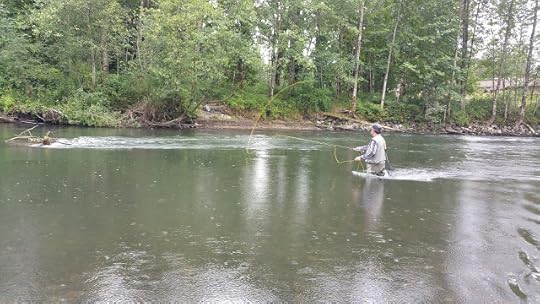 My friend Kurt being poetic on the riverGear: Simms Waders. Korkers Redside Boots. Echo Four Piece Travel Rod 9 ft 5wt. 9ft 4lb leader.
My friend Kurt being poetic on the riverGear: Simms Waders. Korkers Redside Boots. Echo Four Piece Travel Rod 9 ft 5wt. 9ft 4lb leader.Note: That essay I mentioned in the opening paragraph is now available in an expanded version in the new book called Taut Lines: Extraordinary True Fishing Stories.
Lesson Learned the Hard Way: I left my felt bottoms to my boots at home and discovered that wading on mossy rocks with rubber boots was akin to roller skating in an ice skating rink. I fell down too many times and in the end, not having the right gear limited me in my fishing choices.
Published on July 09, 2016 12:15



